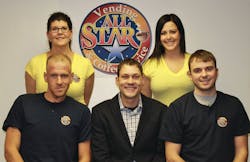Chad Liedman wants his company to grow and be competitive with the big guys. That’s what he decided when he bought All Star Vending & Coffee Service from his grandfather in 2011. Liedman updated many things, such as the company’s logo, its tagline and its Website, keeping in mind his ambition for growth while maintaining the same level of service his grandfather’s customers came to expect.
All Star, located in the Twin Cities, Minn., is now home to five employees: two route drivers, one technician and two office workers. Liedman’s primary goal was to re-create a brand to fit modern times; he wished to make improvements to the already-successful family business while continuing the basic principles on which the company was built. He began by taking an active role in current consumer trends and popular processes that drive traffic towards the machines. He concerned himself with things like technology, social media and eco-friendly practices in vending in order to appeal to a global-minded audience who constantly use smartphones and he enhanced customer loyalty through the use of coupons and user incentives.
Liedman’s strategy to reinvent the business into the twenty-first century has paid off to the tune of a 29.6 percent customer base increase between May 2011 and December 2013.
Selling the business
Ray Visser, Liedman’s grandfather, began his vending career in 1964 when he took a job working for NSI/Griswold in Golden Valley, Minn. “We always had the latest in tech advances in the equipment. We were the first in the area to computerize in the early 1980s when disk drives were the size of small bicycle wheels,” said Visser. In 1987, with the help of a partner, Visser created what is now All Star Vending & Coffee Service.
In 2011, after twenty-four years at the company, Visser sold the majority of All Star to now-owner, Liedman. Although Visser had the latest tech innovations at NSI/Griswold in the 1980s, Liedman found All Star’s technology outdated in 2011 and so he sought to make a drastic transition.
Technology overhaul
Liedman’s first order of business was to revamp the technological components of All Star to make the company more marketable, starting with improving customer service at the point-of-sale. “Our first initiative was to replace the outdated machines and install credit card readers. This set us back a bit financially, but we are now seeing a return on these investments,” said Liedman. “My grandfather had run this business with great success the first twenty-four years, but when he turned the company over to me it was in need of some re-invention.”
Near the end of 2011 and the beginning of 2012, All Star began implementing USA Technologies’ ePort G8. “We finally have credit card readers on our machines. Our next initiative is to implement DEXing,” said Liedman enthusiastically. By installing cashless readers, Liedman was able to bring a convenience to customers that was not offered from All Star before 2011.
But moving to cashless wasn’t the only technology overhaul All Star witnessed. Before Liedman took over, All Star’s Website had little traffic; although it housed company information, it was not used to attract and gain customers. Liedman and his team revitalized the site to host a ‘cover photo’ similar to those seen on social media sites. They created a Facebook page, which now has nearly 100 followers, and became a figure on LinkedIn and Twitter. The Website front page easily lists reasons for customers to choose All Star and it offers ten separate tabs listing every bit of company information from its history to office coffee service to healthy vending products. Currently, the company uses its online presence to attract and maintain customers by offering an interactive and easy Website today’s clients expect.
Though many technological advances were being put in place, Liedman did not want to stray from the solid relationships his grandfather had built.
Maintaining customer loyalty
When companies transition from one generation to another, especially when that transition is between family members, there is often a struggle to decide how to re-create and update a brand while still holding onto the values that make that company unique.
All Star wanted to show customers that, although they were progressing, they still believed in the power of service and the respect for customer relationships. The company did this by maintaining its four pillars of character and promoting those pillars on its Website: Service, Reliability, Accountability and Partnership. “As a small business our success depends largely on customer loyalty. That loyalty begins with providing quality customer service,” said Liedman.
Before leaving the company, Visser had used MEI paper coupons as part of an incentive for customers. When Liedman took over, he decided to continue honoring those coupons and still uses them. The idea is to provide loyalty options to customers. For the future, Liedman plans to keep that tradition of customer loyalty, but in a more technological way. He has plans to implement the new USAT and Isis Mobile Wallet promotion in 2014, along with offering other loyalty programs. “Loyalty cards and programs create return customers and provide good incentives for our customers’ employees as well,” said Liedman. “If employees have good food, snacks and coffee, they are going to be happy.”
To maintain customer loyalty and trust, there is at least one All Star employee on-call 24 hours a day, 7 days a week. “We are running a business. Everyone in this industry knows if a machine is having performance issues its losing revenue,” said Liedman.
To keep things easy for the consumer, All Star even created a survey on its Website that asks customers to rate its service and product offering, among other things. “We see our relationship with our customers as a partnership. We talk to everybody, and we want them to feel important. They have a lot of say in what products are placed in their machines,” said Liedman.
Getting customers to not only use the vending machines in their locations, but to also take part in the product selection is very important to Liedman, which is why he decided that paying attention to consumer trends was advantageous to his business.
By popular demand
The need and desire to drive customers to the vending machine has not diminished since Liedman became owner of All Star, but the process of getting customers to the machines has changed, for the better.
Liedman pays attention to consumer fads. He noticed the consumer preference towards eco-friendly, or “green” products, even as he worked as a technician at All Star before becoming the owner. In 2012, All Star created a “Green Initiative” where they began actively seeking to incorporate environmentally friendly practices by promoting green initiatives in the office and on the routes. All machines are equipped with a VendingMiser to reduce power consumption by roughly 46 percent and the company began installing LED lighting into all machines to help cut power usage. They additionally ask for “green” suggestions from customers.
In order to keep customers satisfied with their vending options, Liedman offers new and healthier items in addition to the products customers already expect. “Those companies that offer vending snack and pop machines for their employees request us to expand or replace existing products with healthier snack and drink options,” said Liedman. He does this by networking with suppliers and others in the industry, as well as following corporate advertising. He tracks ads on television and social media in order to gauge popular consumer products that he then places in his machines.
The staff of All Star constantly looks for ways to please consumers by finding “the next new thing.” In 2005, that next new niche was integration of office coffee service.
Office coffee and micro markets
All Star offers all the large-name brand coffees, but also has its own house blend created by US Roasterie out of Des Moines, Iowa. All Star carries thirteen of US Roasterie’s blends. Of those thirteen, three blends are special blends made specifically for All Star. “If a customer likes a certain brand coffee or a specialty flavor, we will send the package down to them [US Roasterie] and they will tailor a blend specifically for that taste profile that we can then offer to our customer at a lower price,” said Liedman. He also began offering eco-friendly and biodegradable OCS products to customers to keep with the trend.
Single-cup brewer systems remain a growing segment of OCS for All Star. “You have more customers looking for systems that offer the fresh whole bean gourmet coffee experience,” said Liedman. “Growing this segment of our OCS service is included in our 2014 initiatives.”
Another growth initiative for 2014 is to open its first micro market through Lieberman Companies and Three Square Market. “As a small business, we’ve been watching the micro market segment and its growth for three years and feel we are now in a position to move forward,” said Liedman. Adding micro markets will allow All Star to continue growth while simultaneously appealing to consumers’ wants for convenience and broader offerings.
Constantly finding ways to grow his company and appeal to consumer preferences and trends is a challenge Liedman gladly accepts, but not one that he understood until he took the role of head honcho.
Lessons learned
Although he had experience working as a technician before taking over the company, Liedman was taken aback by suddenly being in the ownership and management role. “I didn’t have accounting experience; my grandparents showed me the basics, so that was quite an experience. It wasn’t long and I had office staff to handle that aspect of the business. Everything I do, I learn day by day from experience, from my grandfather or networking with others,” said Liedman.
Since 2011, All Star employees have reduced product waste, learned the most efficient ways to run routes and educated themselves on how to shop suppliers for the best price. “Shopping around wasn’t something I was used to, but now it’s part of our routine,” said Liedman. “This industry is highly competitive and even though we are one of the little guys, my vision is to grow and be competitive in this market, to deliver innovative and efficient solutions to the customer.”
All Star Vending & Coffee Service has faced many changes in the last decade, but Liedman is determined that the changes will help his company grow. “My goal is to be a good, big vendor. I want to grow with the bigger guys,” Liedman said.
All Star has embraced 21st century technologies, sales and marketing techniques to compete with the bigger companies. Partnered with its original mission statement for honesty and integrity, All Star looks towards a future of monetary growth and company expansion. Liedman continued, “We are making the necessary improvements as we go, but we are still keeping the same customer service.”
Company profile:
Location: Minneapolis/St.Paul, Minn.
Owner: Chad Liedman
Equipment/Software: USA Technology ePort G8
Year Founded: 1987
Number of vending routes: 2
Number of OCS routes: 1
Number of employees: 5
All Star most recently began installing a Marley Coffee Kiosk in the Northtown Mall located in Blaine, Minn. Partnering with AVT, Inc and a private investor, All Star will maintenance and stock the new Marley Coffee Kiosk with Marley Coffee and merchandise.
About the Author

Adrienne Klein
Contributing Editor
Adrienne Zimmer Klein is a freelance writer with a background in the vending, micro market and office coffee service industry. She worked as an associate editor and managing editor at Automatic Merchandiser and VendingMarketWatch.com from 2013 until 2017. She is a regular contributing writer at Automatic Merchandiser.
